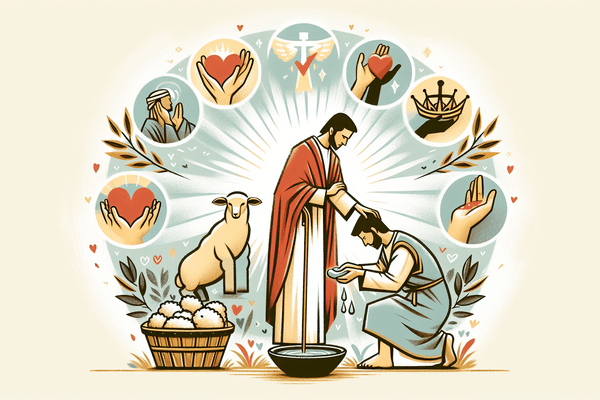Finding Comfort in God When Overwhelmed
Life's demands can often leave us feeling burdened and overwhelmed. In these times, Psalm 55:22 offers a reassuring message, reminding us to 'Cast your burden upon the Lord, and He will sustain you.' The act of laying our troubles at His feet is not a sign of weakness but an affirmation of trust in His ability to provide comfort and strength. Jesus extends an invitation in Matthew 11:28-30, beckoning all who are weary to find rest in Him. By approaching our tasks with a heart dedicated to serving the Lord, as advised in Colossians 3:23, we can find the motivation to press on, knowing that our labor is ultimately for God's glory. And when the challenges seem insurmountable, 1 Peter 5:7 encourages us to cast all our anxieties on Him, for He cares for us deeply.
The Power of Prayer in a Believer's Life
Prayer is the lifeline that connects us to the divine, serving as both a solace and guiding force in our lives. The Lord's Prayer, as presented in Matthew 6:9-13, provides a blueprint for communion with God, encapsulating praise, petition, and penitence. Through prayer, we tap into an intimate dialogue with our Creator, as Philippians 4:6 encourages us not to be anxious but to present our requests to God with thanksgiving. Prayer fortifies our faith, exemplified by the fervent prayers of the righteous that are powerful and effective, as James 5:16 assures us. As we persist in prayer, Ephesians 6:18 urges us to be alert and always keep on praying for all the Lord's people, establishing a community of believers united in faith.
The Second Coming of Jesus and Its Implications
The anticipated return of Jesus carries a profound significance for believers, serving as a beacon of hope and a call to preparedness. The Bible speaks of a time when 'the Lord Himself will come down from heaven,' as described in 1 Thessalonians 4:16-17, promising a reunion with those who have passed in faith. The second coming is a time of both reward and reckoning, with Revelation 22:12 reminding us that Jesus will bring recompense for every deed. This future event encourages us to live vigilant and holy lives, as Mark 13:32-37 warns us to stay awake, for we do not know when the master of the house will come. In the face of such uncertainty, understanding the principles of repentance becomes ever more crucial, as 2 Peter 3:9-10 comforts us with the knowledge that God is patient, wanting everyone to come to repentance rather than face destruction.
Embracing the Essence of Christianity
At the heart of Christian living are the commandments to love God and our neighbors. This core teaching, as expressed in Matthew 22:37-39, encapsulates the essence of what it means to be a Christian. In following these commandments, we reflect the love and devotion that is central to our faith. Furthermore, the belief in Jesus as God, as affirmed in John 10:30 where Jesus says, 'I and the Father are one,' is foundational to understanding the nature of the Holy Trinity. Christians are called to live out their faith through acts of kindness and compassion, exemplified by the fruits of the Spirit listed in Galatians 5:22-23, which include love, joy, peace, patience, kindness, goodness, faithfulness, gentleness, and self-control. Practicing these virtues in daily life is a testament to our commitment to the teachings of Christ.
The Concept of \"Woe\" in Scripture
The term 'woe' in Scripture often signifies a deep sense of distress or an impending judgment, urging the audience to reflect and repent. Prophets in the Bible, including Jesus Himself, used 'woe' to highlight the gravity of sin and the urgent need for a return to God's ways. For example, Matthew 23:13-29 includes a series of 'woe' statements directed at the scribes and Pharisees, calling out their hypocrisy and leading others astray. These warnings serve as a somber reminder that our actions have consequences and that a genuine turning back to God is necessary for spiritual healing. The book of Revelation also contains 'woe' pronouncements, as seen in Revelation 8:13, indicating the severity of the events to unfold and prompting believers to maintain their faith amidst trials.
Conclusion
As we have journeyed through the various topics illuminated by Scripture, it becomes clear that the Bible is not just a historical document but a living guide for our everyday lives. It offers us the strength to overcome feelings of being overwhelmed, the power of prayer for guidance and support, the hope and preparedness inspired by the second coming of Jesus, and the foundational principles that define Christian living. By embracing the Bible's teachings, we can lead lives that honor God and reflect His love to those around us. For further reflection on the divine comfort and promises Scripture holds, consider exploring the insights on eternal crowns, spiritual gifts, and the comfort of Scripture. Let us continue to seek wisdom through the Scriptures and build our lives upon the rock-solid truths it provides.






